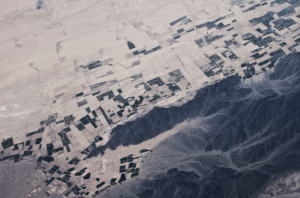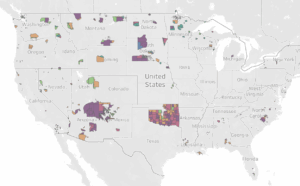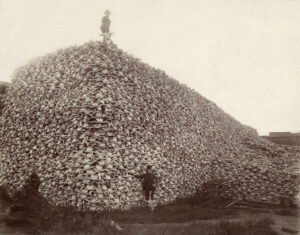January 28th is National Data Privacy Day.
National Data Privacy Day is observed across the globe to raise awareness about the importance of employing trustworthy and ethical data collection methods and protecting citizen privacy. In an ever-evolving technological age, today serves as a reminder for us all to take steps to safeguard our (and our neighbor’s) privacy and adhere to best practices as they are identified by data protection groups, especially those representing historically marginalized communities.
In this blog post, we write about how today’s observance should spark important conversations about Indigenous data sovereignty and violations of Native data protection in the U.S. We also highlight helpful learning resources published by Native-led organizations and Native scholars on best practices for Native data protection.
First, Some History of Data Privacy Day
The history of National Data Privacy Day dates back to 1981, when the Council of Europe opened up for signature the first legally binding international treaty aimed at data protection and privacy known as “Convention 108.” The Council of Europe then decided to launch European Data Protection Day on January 28th, 2007, to be celebrated annually. The United States is a signatory of Convention 108 and adopted its own National Data Privacy Day in 2009, declaring a public commitment to data privacy and protection.
However, a mere declaration of the importance of data privacy is not enough to measure whether data privacy and protection is where it should be in the U.S.—especially regarding Native communities.
What About Indigenous Data Sovereignty?
In the U.S., Native peoples have been the nonconsenting subjects of extractive research and the subjects of poor research that ultimately failed to honor the complexities of their communities. Both of these types of data misuse have led to the stigmatization of Native communities and a decrease in access to desired federal services.
Hand in hand with the challenges resulting from data abuse, much of the data about Native lands is collected and maintained by the BIA and other federal entities, which have their own history of data mismanagement and concealment. This data is not readily available or accessible to Native communities despite the data already existing in the public domain and despite the federal government’s responsibility as a Trustee to provide transparency about their performance. This raises obvious questions as to how tribes can adequately hold outside government entities accountable and easily access the data that is due to them.
Acknowledging this history, and out of concern for the current state of data access, tribes are taking back control over their data and advocating for greater compliance with their Indigenous data sovereignty.
Indigenous data sovereignty is the right of a nation to govern the collection, ownership, and application of its own data. It derives from tribes' inherent right to govern their peoples, lands, and resources.
Native Nations Institute

Linked to the broader concept of tribal self-determination, Indigenous data sovereignty furthers the rights of tribes to make data-related decisions about their own affairs without external interference. This Native-led approach to data privacy and protection addresses the historical injustices and challenges related to data collection, management, and use within Indian Country.
NLAP’s Commitment to Native Data Sovereignty
The enduring lack of government transparency and accountability is why NLAP is committed to honoring Native data sovereignty and supporting Native efforts to expand sovereign research capacity in their communities. NLAP promotes the right of tribes to control what data is collected on their lands and among their members, as well as who has access to that data. Oftentimes, the public datasets that have significant implications for Native land planning are not accessible or usable for tribes.
Native Nations do not have ready access to the data collected by external agents about their citizens, lands, and resources
Rodriguez-Lonebear 2016, Rainie et al. 2017c, Walter 2016
NLAP, with the guidance and feedback from our partners at the Indian Land Tenure Foundation and the Intertribal Agriculture Council, compiles data already in the public domain and makes it accessible and usable for tribes to use for their own purposes. We do not publish tribally-gathered or tribally-owned data on our website, though we do work with tribes one-on-one to assist in the development of private tools upon request.
We believe the federal government has a moral and fiduciary obligation to provide this kind of data access, transparency, and control to tribes, especially data that can be used to assess its performance as a self-appointed Trustee.
We also promote the right of tribes to assume any and all administrative responsibilities currently assumed by the federal government. This includes the complete transfer of, and ongoing collection and management, of their own data and the right to “opt-out” of government data collection. In cases where data on Native lands is collected via remote sensing, we believe that tribes reserve the same right to access and control. Even for our data resources, which provide greater tribal accessibility to important, public datasets, we still honor a tribe’s decision to opt-out of the compiled data on our site in support of this right.
Policies and practices surrounding Indigenous data sovereignty are constantly progressing, especially as the digital age continues to evolve. As we continue to refine our data sovereignty policies in accordance with recent guidelines, it is incredibly important for us as a Native-centered organization to consistently engage with Native data scholars, researchers, organizations, and communities. With guidance from our partners and these other entities, we are able to monitor and enhance our data support tools per the most up-to-date priorities and concerns for Native land planning.
You can read more about our position on Native data sovereignty and our commitment here.
Resources for More Learning
Native organizations, scholars, and data empowerment groups have put together many helpful and powerful resources to foster a greater understanding of Indigenous data sovereignty. Not only do these resources set a critical foundation for how we ought to think about Native data protection, but they also include actionable recommendations for best practices. Check them out below!
- Indigenous Peoples’ Rights in Data: A Contribution Toward Indigenous Research Sovereignty (2023): written by Native data scholars, this article is an excellent resource for grasping the Indigenous sovereignty movement and Indigenous peoples’ rights in data.
- Indigenous Data Sovereignty and Indigenous Evaluation: Improving Philanthropic Practice (2023): this First Nations Development Institute report highlights ways to improve Indigenous data and research practices.
- Life and Times of Data Access: Regarding Native Lands (2023): NLAP and leading Indigenous scholars write about tribal data accessibility and equity.
- Supporting Tribal Data Governance For Indigenous Community Climate Resilience (2019): this policy brief makes recommendations to enhance Indigenous climate resilience through proper Indigenous data governance with a particular focus on Southwest Indigenous communities.
Native Nations Institute. (Accessed 2023). Indigenous Data Sovereignty and Governance. University of Arizona. https://nni.arizona.edu/our-work/research-policy-analysis/indigenous-data-sovereignty-governance
Rodriguez-Lonebear, D. (2016). Building a data revolution in Indian country. In: Kukutai, T and Taylor, J (eds.), Indigenous data sovereignty: Toward an agenda, pp. 253–272. Canberra, Australia: Australian National University Press. DOI: https://doi.org/10.22459/CAEPR38.11.2016.14
Rainie, SC, Schultz, JL, Briggs, E, Riggs, P and Palmanteer-Holder, NL. (2017c). Data as strategic resource: Self-determination and the data challenge for United States Indigenous nations. International Indigenous Policy Journal, 8(2). Retrieved from http://ir.lib.uwo.ca/iipj/vol8/iss2/1. DOI: https://doi.org/10.18584/iipj.2017.8.2.1
Walter, M. 2016. Data politics and Indigenous representation in Australian statistics. In: Kukutai, T and Taylor, J (eds.), Indigenous data sovereignty: Toward an agenda, pp. 79–98. Canberra, Australia: Australian National University Press. DOI: https://doi.org/10.22459/CAEPR38.11.2016.05
Written by Raven McMullin











